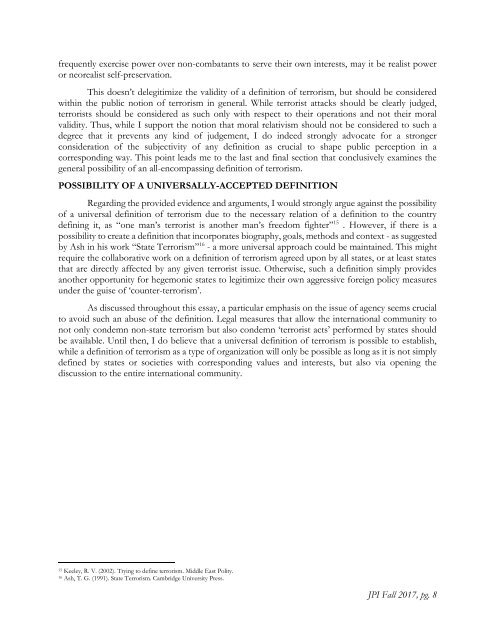JPI Spring 2018
Create successful ePaper yourself
Turn your PDF publications into a flip-book with our unique Google optimized e-Paper software.
frequently exercise power over non-combatants to serve their own interests, may it be realist power<br />
or neorealist self-preservation.<br />
This doesn’t delegitimize the validity of a definition of terrorism, but should be considered<br />
within the public notion of terrorism in general. While terrorist attacks should be clearly judged,<br />
terrorists should be considered as such only with respect to their operations and not their moral<br />
validity. Thus, while I support the notion that moral relativism should not be considered to such a<br />
degree that it prevents any kind of judgement, I do indeed strongly advocate for a stronger<br />
consideration of the subjectivity of any definition as crucial to shape public perception in a<br />
corresponding way. This point leads me to the last and final section that conclusively examines the<br />
general possibility of an all-encompassing definition of terrorism.<br />
POSSIBILITY OF A UNIVERSALLY-ACCEPTED DEFINITION<br />
Regarding the provided evidence and arguments, I would strongly argue against the possibility<br />
of a universal definition of terrorism due to the necessary relation of a definition to the country<br />
defining it, as “one man’s terrorist is another man’s freedom fighter” 15 . However, if there is a<br />
possibility to create a definition that incorporates biography, goals, methods and context - as suggested<br />
by Ash in his work “State Terrorism” 16 - a more universal approach could be maintained. This might<br />
require the collaborative work on a definition of terrorism agreed upon by all states, or at least states<br />
that are directly affected by any given terrorist issue. Otherwise, such a definition simply provides<br />
another opportunity for hegemonic states to legitimize their own aggressive foreign policy measures<br />
under the guise of ‘counter-terrorism’.<br />
As discussed throughout this essay, a particular emphasis on the issue of agency seems crucial<br />
to avoid such an abuse of the definition. Legal measures that allow the international community to<br />
not only condemn non-state terrorism but also condemn ‘terrorist acts’ performed by states should<br />
be available. Until then, I do believe that a universal definition of terrorism is possible to establish,<br />
while a definition of terrorism as a type of organization will only be possible as long as it is not simply<br />
defined by states or societies with corresponding values and interests, but also via opening the<br />
discussion to the entire international community.<br />
15<br />
Keeley, R. V. (2002). Trying to define terrorism. Middle East Polity.<br />
16<br />
Ash, T. G. (1991). State Terrorism. Cambridge University Press.<br />
<strong>JPI</strong> Fall 2017, pg. 8
















